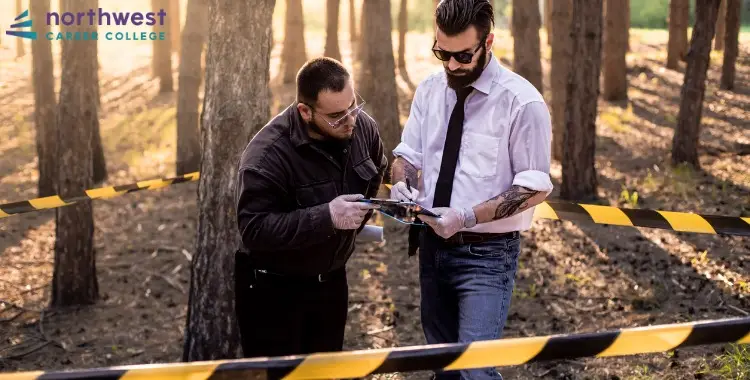Top 10 Emerging Trends in Criminal Justice for 2024: What You Need to Know
- Criminal Justice
- February 28, 2025
- 3.9k views
- 5 min read

Change is constant, and the Criminal Justice system is no stranger to change. Numerous new technology trends that have recently emerged have profoundly impacted the Criminal Justice system. Let’s discuss some of the most powerful trends we expect to maintain or gain momentum in 2024.
Read More: Is a Criminal Justice Program Expensive?
Table of Contents
AI-Powered Predictive Policing
Artificial intelligence has become the hottest technology trend in the past two years. Over the next several years, it is on track to become a huge factor in almost all aspects of our society. Many individuals have talked and written about the changes AI will make to the legal and criminal justice sector. Most analysts agree that law enforcement efforts may advance faster if they use AI for surveillance and predictive policing. Leading criminal justice programs are already incorporating AI-focused coursework to prepare future professionals for this technological revolution in law enforcement.
Blockchain
Blockchain is a technology that operates like a digital ledger or record book, storing information in a series of connected blocks. Each block contains data, and once it’s added to the blockchain, it can’t be changed. This makes blockchain incredibly secure and reliable. Imagine blockchain technology being put to use within the criminal justice system. It could change how evidence is kept and handled. Some companies are already trying to implement this technology and it is likely just the beginning.
VR for Rehabilitation
Virtual Reality (VR) holds great promise as a technology that can aid in the criminal justice field. VR could potentially improve several aspects of the criminal justice system. Immersive experiences may enhance the comprehension, decision-making, and training efficiency of individuals working throughout the criminal justice system. As VR technology progresses, criminal justice experts expect it to have a greater impact on the future of criminal justice.
Evidenced-based Policing
Using reliable, high-quality evidence to guide policy decisions is the essence of evidence-based policing. To determine the most effective strategies for maintaining community safety, police departments examine statistics and research.
Proponents of this approach emphasize how important it is to test their theories using scientific approaches. Using this method, law enforcement agencies test out several tactics to see which are most effective in lowering crime and improving community safety.
However, this entails more than merely applying cutting-edge science. It also involves resource management, particularly in tough times. To ensure that they are allocating their resources as wisely as possible to maintain community safety, they employ evidence-based policing.
Community-Oriented Policing
Now, let’s discuss how police officers are operating in a slightly different manner. In this trend, they are becoming more involved in the community rather than just driving around in their cars. What’s the main concept underlying this? It’s about establishing relationships and a foundation of trust between police officers and the community they serve.
Restorative Justice Practices
Restorative justice is about fixing harm caused by crime. It’s not just about punishing the person who did it. It brings together everyone involved – the victim, the person who did it, and others affected – to talk and find solutions. This helps everyone feel heard and understood.
Addressing Bias and Unfair Sentencing in the Legal System
It is unfair when members of various groups or populations receive disparate sentences from other individuals under similar circumstances. The system’s inherent biases and unfairness are one explanation for how this can occur.
Research indicates that factors such as income and race can influence the severity of the punishment for the same offense. Sentimental reform is being worked on as a solution to this problem.
Judges and others are receiving training to help them recognize biases and have a deeper understanding of various cultures. Ensuring equitable treatment for all individuals throughout the legal system is crucial, irrespective of gender, color, or financial status.
Bail Reform
Bail reform is becoming more popular as proponents seek to end systemic inequalities and reduce the number of people detained before trials. The focus is on creating alternatives—like supervised release programs and risk assessment instruments—to prevent individuals from being imprisoned just for lack of financial means.
Decriminalization of Drug Offenses
As governments reevaluate their approach to combating substance usage, there is a growing urge to legalize drug offenses. Many are implementing public health strategies in place of punitive actions. This means that penalties for small amounts of drug use will be reduced, and funding for treatment and harm reduction programs will be prioritized.
Expungement and Record Sealing
The fight for record sealing and expungement is one of the most important phases in assisting those with criminal histories to reintegrate into society. While amnesty completely removes a criminal record from the public record, sealing only restricts access to it, making it easier for people to find housing, work, and other opportunities.
Conclusion
This brings an end to our list of the top ten emerging themes in criminal justice for 2024. It is impossible to precisely predict how these trends will manifest, but any reforms or enhancements that are implemented represent a step toward a more equitable and just society. By recognizing these developments, we can have a positive impact on changes to the criminal justice system.





